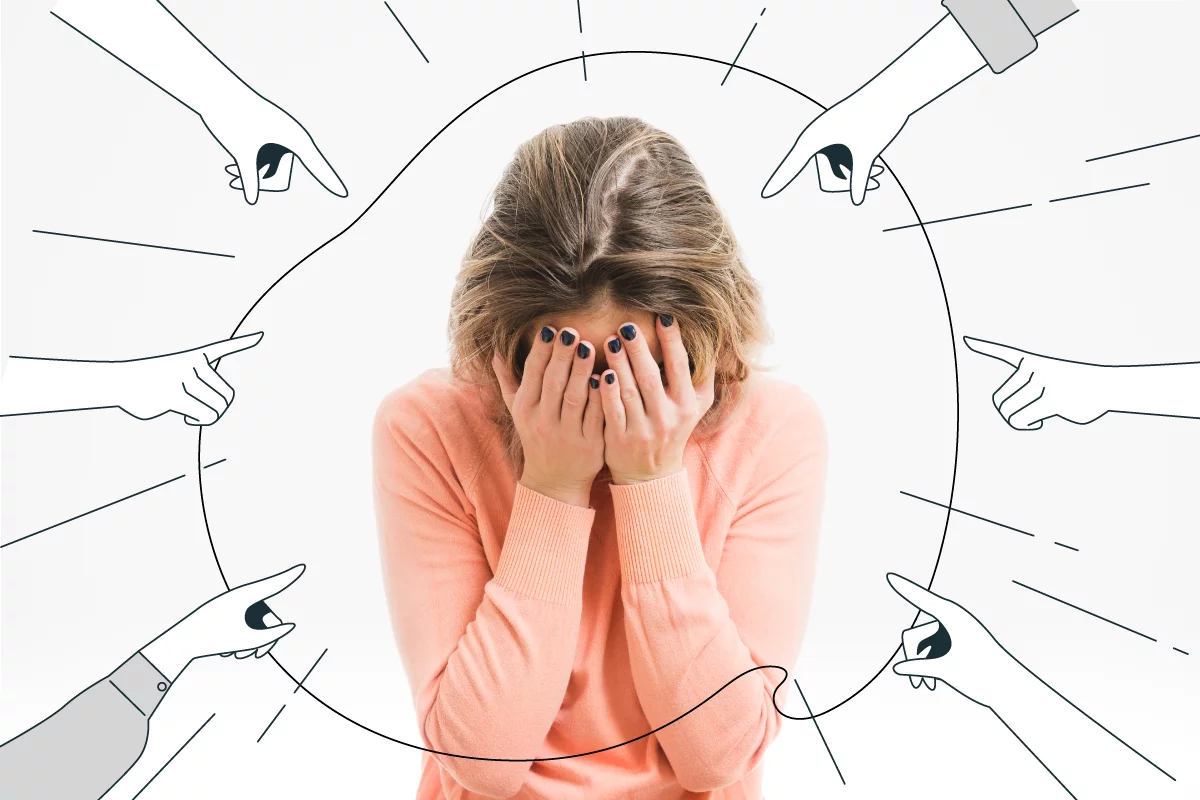Facing down an addiction and choosing recovery is an incredibly brave step, but can be undermined if our inner critic won’t stop broadcasting all our fears and self-doubts. Learning more about negative self-talk and overcoming overthinking are key to a lasting recovery.
Our inner monologues often drive our general outlook, with the constant narrative inside our head setting the stage for how we perceive ourselves and what’s around us. For some of us, that inner critic is gentle, even when critical, carefully probing situations and our actions to help guide us towards a solution. For others, this voice is relentlessly negative self-talk, harshly judging every thought and action and tearing at our self-esteem.
For those living with addiction, substance abuse may help quiet a cruel inner critic, though only temporarily. After the effects of a night of drinking or drugs wear off, the voice is back and twice as self-blaming. Even if someone chooses to enter recovery, the inner critic remains, casting a negative light upon what is otherwise a positive and healthy development in one’s life.
So how does someone free themselves from this persistent mental bully? Awareness and patient pushback are essential, as is professional support. Be assured that any effort you make will be worth it, as learning to silence the inner critic helps remove a potential obstacle to recovery.
Start from the Beginning: Where Did the Inner Critic Come From?
Everyone has some version of an inner critic, but not all people have an internal monologue filled with constant, self-criticism. If yours is a relentless bully, it’s important to understand why the voice of your subconscious has developed in this way.
The first thing to remember is that this harsh voice that lives in your head is not your fault. Typically, this voice is developed through childhood trauma and negative experiences growing up. As author and certified mental health coach Darius Cikanavicius writes:
If the caregiver reflects to [the child] an inaccurate picture of themselves, they will internalize it and accept it as truth. At the least it will become an important part of their self-image, regardless of whether or not it’s correct. Thus, if the caregiver tells the child they are stupid, bad, and worthless, the child cannot help but believe this at some level.
Some who examine the inner voice with the help of a therapist may identify the sound of the voice as someone in their early life – a parent, teacher, or other caregiver. This can help better understand where the inner critic is coming from, and how to address the root causes of the negativity in its messaging.
These root causes often feed into tendencies towards addiction as well, and so knowing them is important in beginning to unravel what fuels your addiction, and how to resolve these issues and develop different strategies by which to cope.
Cultivate Awareness of When Your Inner Critic is Talking
Most of us aren’t always aware of when our inner critic is speaking up. Like the news ticker running at the bottom of a 24-hour news channel, it’s almost always there, but we tune in and out of it during our day. Despite the fact that we may not be consciously listening to our inner critic, it still plays an important role in determining how we perceive ourselves and the world around us. It is also behind bouts of over thinking, where we may spiral into self-criticism and self-blaming.
When you are able to tune into your inner critic, consider writing down some of what you hear it saying. Analyse how this negative self-talk makes you feel and connect it back to the way you approach your life. This can be an important starting point for starting to consciously redirect your thinking and challenge negative patterns of thought, which are also critical elements in recovering from addiction.
Understand Triggers for Your Inner Critic
As you begin to become more aware of when your inner critic is active, try to also pay attention to what really gets your inner critic going on self-criticism and self-blaming. Does it seem to be more active at certain times of day? More vocal at work than at home – or vice versa? Does it coincide with high-stress situations, or when you are observing certain qualities about yourself?
Learning what the triggers are for this negative narrative can help you begin to anticipate it, and understand more about what’s behind it. You may find that the triggers for your inner critic are similar to those for your addiction, and that addressing these dually benefits your recovery.
Identify When the Inner Critic May Be Trying to Help…or Harm
The harshness of the inner critic is often what people struggle with, but wrapped within the negative self-talk may also lie a desire to protect. For example, if your internal narrative around recovery sounds something like, “What’s the point of starting? You always just give up anyway,” there are a few ideas that could be behind this message. Your subconscious may be trying to protect you from the disappointment or instability that could arise from potential failure, or asking you a legitimate question about your willingness to commit to sobriety. Either way, this may be a moment where your inner critic is raising an important issue for you to consider in order for you to move forward.
If your inner critic is abusive or shaming, it is also important for you to be able to identify this tone and to consciously reject this. A good way to evaluate this is to consider how you would react if someone said the same thing to a person you love. Prioritise giving yourself the same respect and care, and you’ll find it easier to push back if your inner critic is insulting or cruel.
Get Professional Support to Manage Your Inner Critic
Because the inner critic is often deeply rooted in the subconscious, and the product of longstanding trauma or mistreatment, professional support is often needed to begin to address and change this narrative. This is especially important when an inner critic is part of a cycle of addiction.
Cognitive behavioural therapy, or CBT, is a form of talk therapy specifically focused on identifying negative patterns of thought or behaviour, uncovering root causes of these patterns, and developing and practicing new, healthy patterns. This popular therapy is a hallmark of many mental health and addiction treatment programmes, and is very useful in helping to redirect or silence a destructive inner critic.
Finding Compassionate Addiction Treatment at The Dawn Rehab Thailand

The Dawn Wellness Centre and Rehab Thailand is a specially designed rehabilitation and wellness facility created to foster an environment of personal growth and healing for people who want to change their lives and overcome addiction or mental health issues.
Internationally accredited by the American Accreditation Commission International (AACI), and nationally licensed by the Thai Ministry of Health, The Dawn offers tailormade programmes that cater to each individual’s needs by using a comprehensive, holistic treatment method and modern techniques with proven results.
Addiction and Mental Health Treatment in Thailand
Our centre is conveniently located just outside the beautiful city of Chiang Mai, Thailand, a one-hour flight from the country’s capital of Bangkok. At our tranquil riverfront property, surrounded by picturesque rice fields and traditional Thai villages, you are completely removed from your triggers – the people, places and things that contribute to your condition – and immersed in a safe and soothing environment.
Call The Dawn today to learn more about how we can help you effectively manage your inner critic during recovery and live a happier, healthier life.
About the Author
John A. Smith is a Senior Psychotherapist at The Dawn and an internationally accredited Addiction Treatment Professional (ISSUP), Certified Life and NLP Coach. He is highly experienced in working with young adults and utilises a range of evidence-based therapies, including SMART Recovery, to help his clients achieve their goals.
Related Posts
 Why is Self-Esteem Important for Mental Health in 2023?
It is impossible to overstate the importance of self-esteem and mental health in achieving personal goals and strengthening the relationship you have with yourself and others. This year, commit to...
Why is Self-Esteem Important for Mental Health in 2023?
It is impossible to overstate the importance of self-esteem and mental health in achieving personal goals and strengthening the relationship you have with yourself and others. This year, commit to...
 Your Own Worst Enemy: Stop Self-Sabotaging Your Addiction Recovery!
Just when it seems like you are about to make significant progress in your recovery, something goes wrong, and you are back to square one. While setbacks like these might...
Your Own Worst Enemy: Stop Self-Sabotaging Your Addiction Recovery!
Just when it seems like you are about to make significant progress in your recovery, something goes wrong, and you are back to square one. While setbacks like these might...
 A Powerful Poison: The Terrible Impacts of Toxic Shame
Toxic shame is a serious threat to personal wellbeing, but professional support and treatment can help you understand, manage and eventually overcome its effects. Shame is one of those feelings...
A Powerful Poison: The Terrible Impacts of Toxic Shame
Toxic shame is a serious threat to personal wellbeing, but professional support and treatment can help you understand, manage and eventually overcome its effects. Shame is one of those feelings...
 Finding the Right Words: How to Talk to Someone With an Addiction
Having a constructive conversation with someone struggling with an addiction can be challenging, especially when your own fears and frustrations may be clouding your thoughts. Doing some research beforehand and...
Finding the Right Words: How to Talk to Someone With an Addiction
Having a constructive conversation with someone struggling with an addiction can be challenging, especially when your own fears and frustrations may be clouding your thoughts. Doing some research beforehand and...






